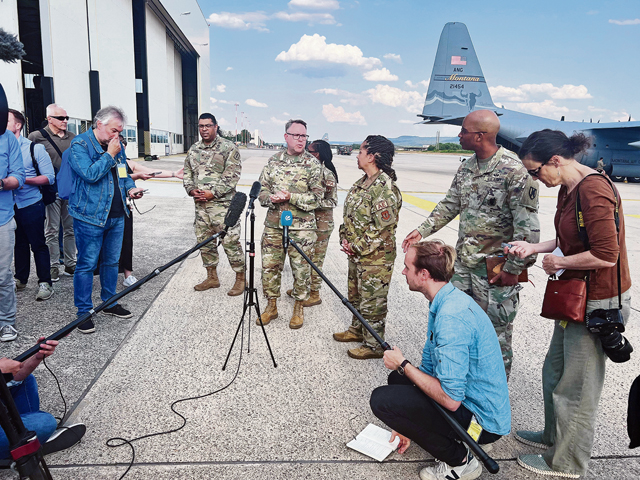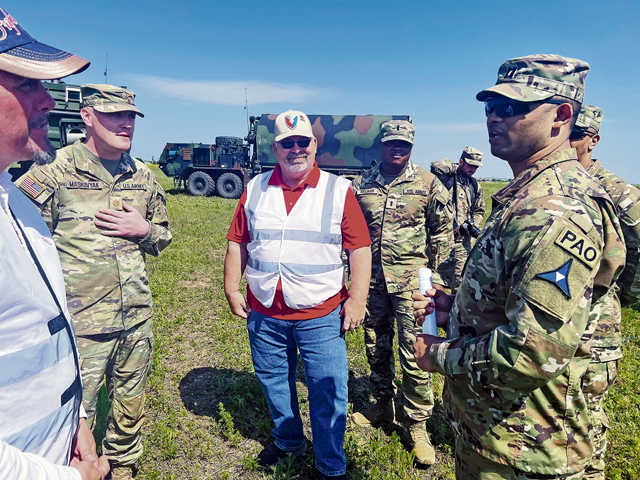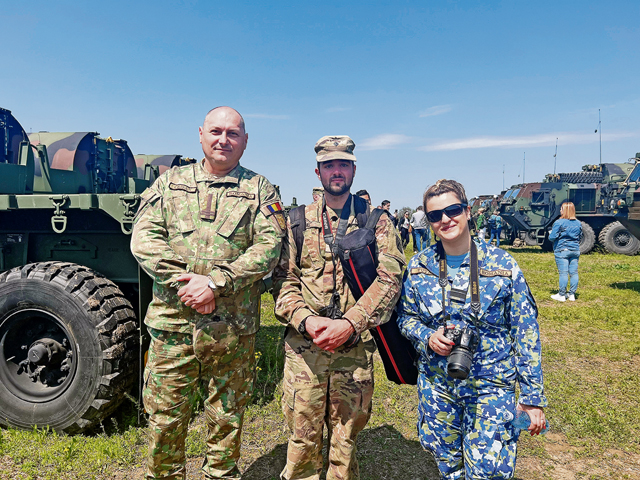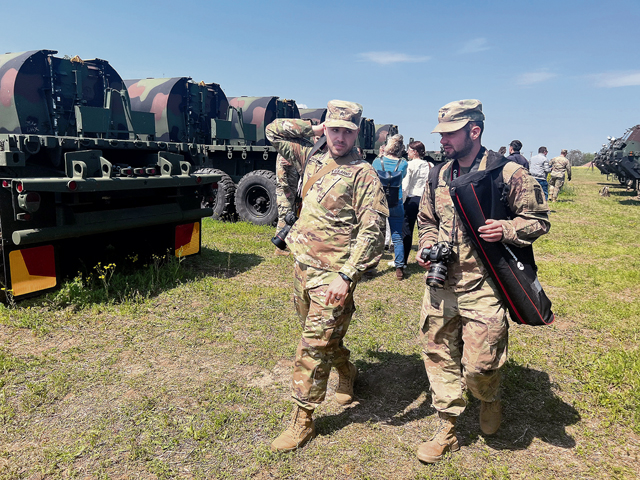
If a tree falls in the forest and no one hears it, does it make a sound?
If more than 24,000 Service Members from 20 nations participate in a large-scale global exercise, and no one reports on it, does it send a message?
The debate about falling trees is ongoing, but there is no arguing the need for accurate reporting during the U.S. Army Europe and Africa-led exercise DEFENDER 23. The European continent-wide exercise took place April 22 to June 23, with significant activity in the Balkans and Romania.
As U.S. and Allied Soldiers came together to train as they fight, so too did joint force and multinational public affairs professionals collaborate to ensure the public, especially communities where training took place, received truthful information regarding their activities.
Public affairs efforts directly supported the DEFENDER 23 mission to deter adversaries as the nested exercises Swift Response 23, Immediate Response 23 and Saber Guardian 23 transformed operational mission command, built readiness, and strengthened the Alliance in the United States European Command’s area of responsibility.

“There are hundreds of DEFENDER 23 stories that speak to mission success,” said 21st Theater Sustainment Command public affairs officer Maj. Vonnie Wright. “It’s our job to make sure they get told. It’s the best part of my career field and what made me want to join this functional area.”
Those stories include Croatians taking the lead for logistic operations moving U.S. military equipment for the first time as Soldiers from the Croatian Support Command unloaded the Minnesota National Guard’s 34th Infantry Division equipment from a Croatian naval ship at Zadar Gaženica for onward movement to Udbina Air Base, Croatia.
Wright and the 319th Mobile Public Affairs Detachment worked with Cabinet of Croatian Chief of General Staff Sgt. Maj. Boris Brdaric, STRATCOM NCO, to coordinate coverage of the historic event. Brdaric said it was a privilege to work with them as well as 205th Theater Public Affairs Support Element and 34th ID PAO during DEFENDER 23. As the Croatian public affairs coordinator, Brdaric was in contact with his country’s Ministry of Defense PAO and more than 15 Croatian media outlets, providing them information on DEFENDER 23, reaching far more audiences with more relevant messages than the U.S. Army could develop and disseminate on its own.

“Sharing ideas, best practices and background info is key, crucial, in fighting our adversaries in the field of StratCom [strategic communications],” said Brdaric. He said the opportunity to work with U.S. Army public affairs personnel in the field was valuable experience for his team.
Brdaric said one of his favorite DEFENDER 23 experiences, and an example of the value of collaboration, was being able to showcase exercise highlights during a distinguished visitors day in Udbina.
“We couldn’t make such effective videos without content from U.S. Army and U.S. Air Force PAOs who were covering DEFENDER 23 activities all over the theater,” said Brdaric.
In addition to building interoperability and relationships with Allies, U.S. Army PAO worked with their counterparts in the U.S. Navy and U.S. Air Force to highlight joint force efforts, such as HOSPEX 23. Led by the 30th Medical Brigade, HOSPEX 23 evaluated and trained deployed medical capabilities with Allies, supported by the U.S. Air Force 86th Aeromedical Evacuation Squadron simulating medical evacuations on a C130J from Romania to Ramstein Air Force Base. Public affairs personnel from 21st TSC, U.S. Air Force Europe-Air Force Africa, 86th Airlift Wing, Ramstein AFB and Medical Readiness Command Europe collaborated on a media day that gave U.S. and international media access to the Ramstein AFB flight line as well as senior leaders from the U.S. Army and U.S. Air Force. The result was extensive international media coverage of a successful Ally and joint force effort.

“The experience working with my fellow PAOs during DEFENDER 23, and specifically the HOSPEX, is an example of a successful joint communications activity across the services,” said Cpt. Jose Davis, Media Operations Division, HQ USAFE-AFAFRICA Public Affairs.
Davis said today’s dense information environment makes networking with other PAOs, across forces and with Allies, essential.
“We are really pushing at integrating and not just being interoperable, but being interchangeable,” said Davis. “We’re not just producing content for the U.S. Air Force or the U.S. Army, we are producing content for NATO, for an alliance of countries.”
He said the 21st TSC, Army Support Activity-Black Sea, the U.S. Air Force and Romanian PAO working together to cover the HOSPEX was a perfect paradigm on working collaboratively in a common information environment to communicate a common operation.
A significant amount of planning and coordination went into helping media communicate an accurate and compelling DEFENDER 23 narrative. Media days in various countries throughout DEFENDER 23, gave reporters access to senior leaders and subject matter experts — briefed and prepped by public affairs staff —and opportunities to see equipment up close. According to Wright, these special media events helped shape the narrative and enhance media relations.
They included a media day at Mihail Kogalniceanu Air Base in Romania, May 19.
“Employing Army Prepositioned Stocks was a DEFENDER 23 focus,” said Wright. “Inviting media to observe the 405th Army Field Support Brigade issue prepositioned stock to the 50th Multi Role Bridge Company in support of the Saber Guardian 23 wet gap crossings amplified our ability to rapidly deploy equipment to support a large combat-credible force from within Europe as well as from the United States.”
The event was a collaboration between PAO from the Romania Defense Staff, 21st TSC, Army Support Activity-Black Sea, and 7th Mobile Public Affairs Detachment, which led Saber Guardian 23 public affairs planning. 10th Mountain Division, deployed for DEFENDER 23, also supported.
“The coordination of any media day requires a great deal of work and, foremost, teamwork,” said Lt. Col. Dan Crisan, Public Affairs Section of the Romanian Defense Staff. He said he felt fortunate to be able to join forces with U.S. Army public affairs to conduct a successful event.
“We delivered in terms of accomplishing our goals and we delivered news to local, national and international media,” said Crisan.
7th MPAD team leader Cpt. Avery Smith, said collaboration helps public affairs cover diverse and geographically dispersed exercises under tight deadlines to counter mis/disinformation.
“Our stakeholders should be receiving information quickly and accurately before our adversaries have the chance to spin reality into their own propaganda efforts,” said Smith. “Although time is a challenge for us, it is also a challenge for our adversaries, and how we spend our time in the information space will determine who better shapes the narrative.”
Relationships are essential to meeting that PAO mission, according to Josh Rojas, director of public affairs for ASA-Black Sea, who along with community relations specialist Oana Copaceanu, developed a strong working relationship with Smith during his deployment at MK Air Base, and enthusiastically supported DEFENDER 23.
The strong teamwork was evident during at least two different media days hosted at MK Air Base during DEFENDER 23.
“If there was an exercise or a media event that had to be coordinated, we did everything in our power to make sure those exercises would go off without a hitch,” said Rojas. “We are proud to say that we were able to provide support for V Corps, 7th MPAD, 21st TSC and the 519th Hospital Center with various exercises throughout DEFENDER 23.”
In all, U.S. military public affairs personnel posted nearly 5,000 DEFENDER 23 photos, articles and videos to the Defense Visual Information Distribution Service, documenting history and growing relationships with their colleagues across forces and with Allies. Along with the external coverage generated by media days, press releases and other outreach activities, public affairs personnel made sure the DEFENDER 23 message — that the U.S. is a coalescing force in Europe improving interoperability and readiness and strengthening resolve across the Alliance — resounded around the globe.
“We are stronger together and working side by side we became even stronger,” said Crisan.


